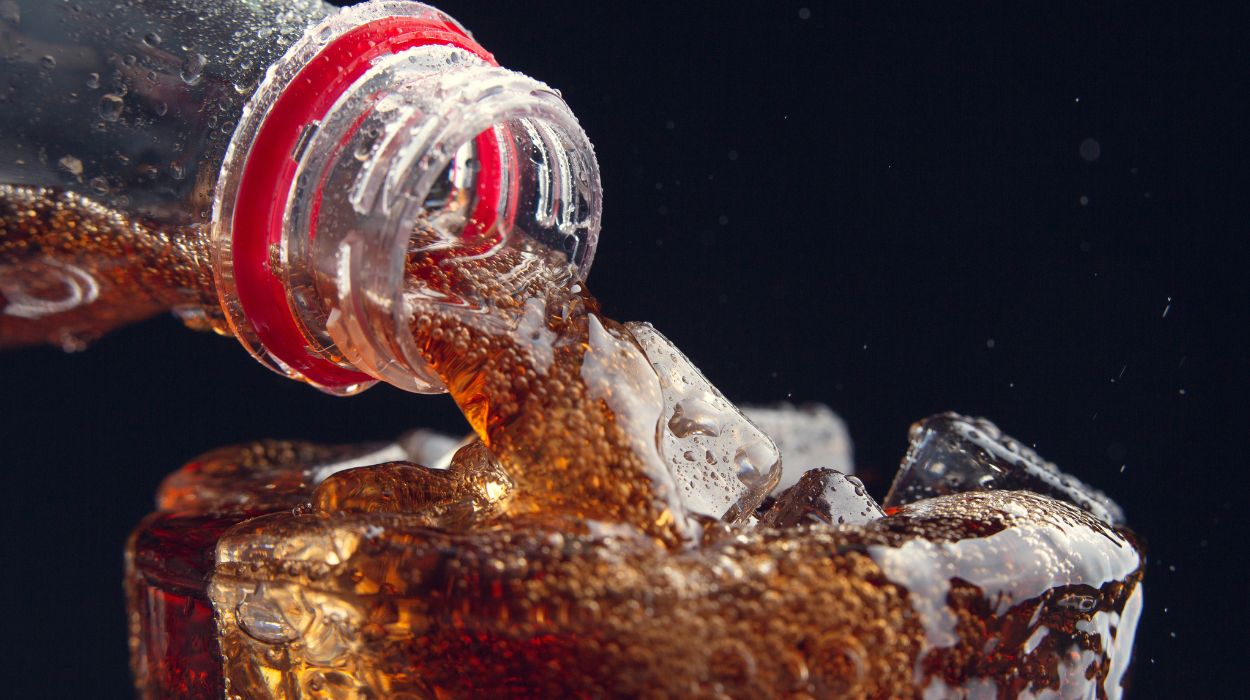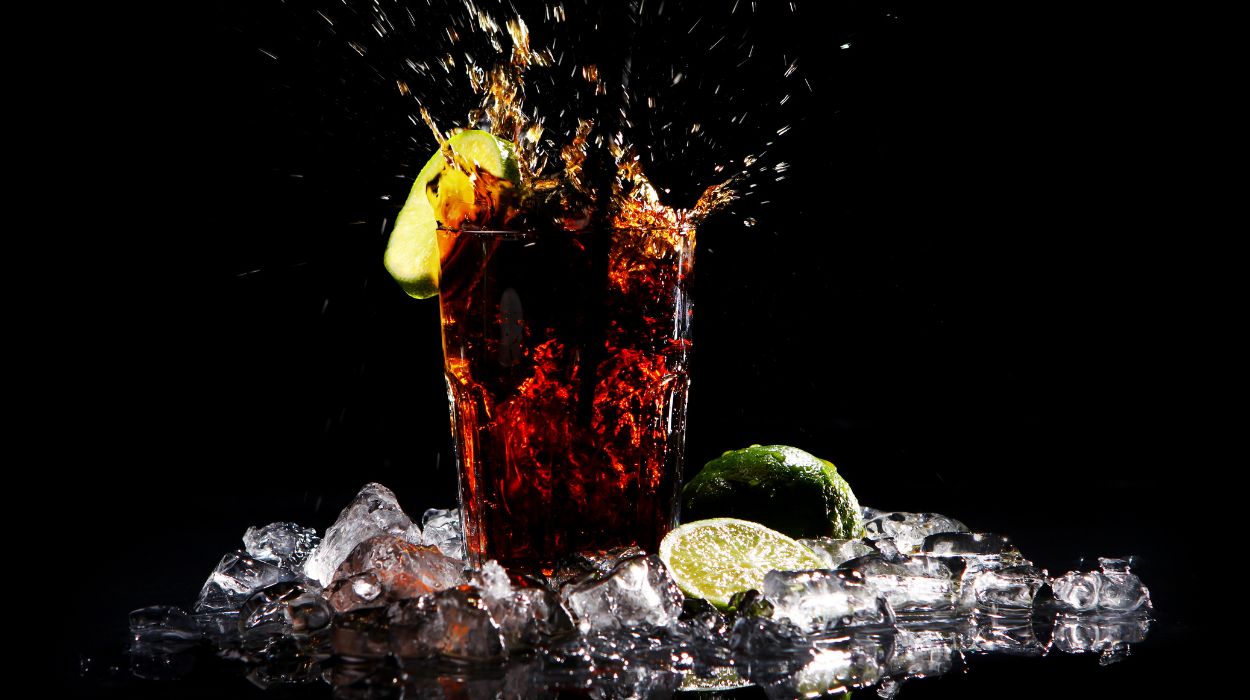 Expert's opinion
Expert's opinion
Expert's opinion
The article is a subjective view on this topic written by writers specializing in medical writing.
It may reflect on a personal journey surrounding struggles with an illness or medical condition, involve product comparisons, diet considerations, or other health-related opinions.
Although the view is entirely that of the writer, it is based on academic experiences and scientific research they have conducted; it is fact-checked by a team of degreed medical experts, and validated by sources attached to the article.
The numbers in parenthesis (1,2,3) will take you to clickable links to related scientific papers.
Can You Drink Soda While Pregnant? Is It Safe & Healthier Alternatives In 2024

When it comes to pregnancy, many women wonder, “Can you drink soda while pregnant?” There is limited research on the effects of drinking soda while pregnant and conflicting opinions on whether it is safe or not. This is because soda has several ingredients of concern, such as caffeine, sugar, and artificial sweeteners.
However, most healthcare providers agree that consuming large amounts of soda, particularly those with a high sugar or caffeine content, may negatively affect both the mother’s and the developing fetus’s health.
Here in this article, you can find the effects of these drinks on your pregnancy and what alternative drinks you can consume instead.
Can You Drink Soda While Pregnant?
The short answer is that you should limit soda consumption during pregnancy, and if consumed, it should not be a daily habit. It is even better not to consume it at all, particularly if you have blood sugar problems.
Why Expectant Mothers Should Limit Soda Intake?
Regular soda contains high levels of sugar, which can contribute to weight gain and other health issues during pregnancy. Sugar-sweetened sodas can lead to gestational diabetes,[1] which means impaired carbohydrate metabolism, and pre-eclampsia,[2] which is high blood pressure developed during pregnancy, can occur with both sugar-sweetened and artificially sweetened carbonated soft drinks. Studies[1] even showed that soda consumption in the pre-pregnancy period might increase the gestational diabetes risk for mothers.
Another major concern with drinking soda during pregnancy is the high caffeine content found in many soda brands. During pregnancy, women are often advised to limit their maternal caffeine consumption to 200 milligrams per day as it can adversely affect the developing fetus.
Also, the consumption of sodium benzoate found in beverages[3] may lead to memory and motor coordination impairments. It is stated that it may increase harmful chemicals, such as malondialdehyde levels, in the brain. These beverages that contain sodium benzoate may promote the development of attention deficit hyperactivity disorder in children.
Therefore, sugar sweetened soft drinks during pregnancy and postnatal if breastfeeding can be linked to cognitive impairment and childhood obesity. It is, therefore, beneficial to limit soda consumption during pregnancy and lactation and if hoping to conceive since the intake of one or more sodas per day decreases the chances of conception.
Let’s examine these effects in detail.
Ingredients Of Soda That Can Harm Your Baby

Here are the nutrition facts[4] of the sugar-sweetened soda for one serving (1 can, 355 milliliters):
- 138 kilocalories.
- 35 grams of sugar.
- 39 milligrams of sodium.
- 34 milligrams of caffeine.
As they mentioned, soda is not a source of favorable nutrients such as protein, fiber, healthy carbs, healthy fat, or any vitamin and mineral. Let’s look at what research says about the effects of each problematic ingredient in soda that may cause problems in pregnancy.
Excessive Sugar
The caloric content of sugar-sweetened soda comes from a basic carbohydrate, which is sugar, also known as sucrose. Sugar provides a significant source of empty calories, which can contribute to weight gain and other health problems and lead to spikes in blood sugar levels. Therefore excessive consumption can have serious consequences for both the mother and the developing fetus.
You can consume sugary drinks easily without noticing that you have too much sugar intake. They provide too many empty calories that are not satisfying to your appetite. Even worse, they stimulate your hunger due to the blood sugar fluctuations they cause.
High sugar intake during pregnancy negatively affects your baby in each stage of its development, during embryonic and fetal growth. These effects may extend into infancy, childhood development into adulthood.[5]
Pre-eclampsia is another important outcome of high sugar intake during pregnancy because it is one of the leading reasons for abortion. A prospective study[6] of 32,933 women indicated that added sugar consumption was higher in women who developed pre-eclampsia than in healthy women. In the same study, consumption of sugar-sweetened carbonated beverages higher than 125 milliliters daily was determined as high consumption and found to be related to pre-eclampsia risk.
Effects Of Sugar In Pregnancy On Infants And Children
A study[7] including 3,312 mother-child pairs showed that sugar-containing beverage intake during pregnancy affected childhood obesity. Children of women who consumed sugar-containing beverages in the first trimester of their pregnancy had a higher fat mass and body mass index at six years of age.
Additionally, it was shown in several studies that a mother’s increased free sugar consumption during pregnancy might be related to an increased risk of developing allergies and asthma[8] in babies. It can be associated with the dietary sugar effects on the gut microbiome, which plays a role in the development of the fetal immune system.
Caffeine
Occasional soda consumption leads to high caffeine intake without noticing.
Caffeine is a stimulant that can cross the placenta and affect the developing fetus. This can result in reduced blood flow to the placenta, which can cause a decrease in oxygen and nutrients available to the fetus, leading to decreased fetal growth. Studies have shown that high levels of caffeine intake during pregnancy can increase the risk of miscarriage.[9]
Most healthcare providers recommend moderate caffeine consumption for expectant mothers, which is no more than 200 milligrams[10] per day, the equivalent of two cups of coffee. This can be challenging for women who enjoy soda, as many popular brands contain high levels of caffeine.
Instead of getting this amount of caffeine from one coffee at a time, you can choose to get it from some herbal teas such as hibiscus tea, and ginger tea that contain less caffeine per serving.
Artificial Sweeteners
Artificial sweeteners are widely used as a sugar substitute in various food and beverage products, and their consumption has been growing in recent years. While they offer a low-calorie alternative to sugar, artificially sweetened beverage consumption in pregnancy remains a subject of debate and research. You may wonder if you can drink diet sodas while pregnant.
It is better not to indulge. Some studies have linked the consumption of artificial sweeteners to an increased risk of infant weight gain,[11] glucose intolerance, and negative changes in the microbiota.[12] Additionally, some studies have suggested that artificial sweeteners[13] may alter the composition of bacteria in the gut, which can impact glucose metabolism and insulin sensitivity, leading to glucose intolerance and other metabolic disorders.
Although there is limited research on the effects of artificial sweeteners on pregnancy, most healthcare providers recommend that expectant mothers limit their consumption of these products as a precaution. Saccharin and cyclamates are definite no-nos during pregnancy.
What Are The Risks Of Soda For The Future Of Your Baby?
Studies that we mentioned above show that our current health status is also determined by our conditions in the womb, which is called metabolic programming[7] in early life stages.
If a mother consumes high sugar during pregnancy, her baby will likely develop diabetes in the future. Babies born with a high birth weight face the risk of future obesity. Children with increased adipose cells during infancy may face weight problems throughout their lives. Obesity and diabetes have cardiovascular effects. These babies may be at risk for many diseases, including cardiovascular diseases, in the future.
In addition, we can say that not only diseases or genetic characteristics but also eating habits are transferred from family to child. Therefore, if you have a habit of consuming soda, it is a good start for you to reduce your consumption starting from pregnancy. Because children are a good mirror, they eat what their parents eat. In this way, you will avoid setting an unhealthy role model for your baby if your infant or child does not see you indulging in sugar-sweetened beverages.
How Much Soda Is Safe While Pregnant?

It is important to note that while drinking soda in moderation may not cause harm during pregnancy, it is not an ideal beverage choice.
Even if you want to consume soda, you may put a couple of soda-free days between your soda consumption. Also, you can be strict about not consuming more than one serving. By doing this, your body may have more time to clear harmful ingredients in soda.
Adding highly nutritious vegetables and fruits, whole grains, healthy nuts, and good-quality protein sources can help your body metabolize the soda that you drink.
Alternatives To Soda During Pregnancy
Soda provides little to no nutritional value and can replace more nutritious drinks and wholesome foods. Expectant mothers should aim to drink plenty of water to stay hydrated and eat a balanced diet to provide essential macro- and micro-nutrients for both themselves and their developing fetus.
Smoothies
Preparing smoothies could be one of the best options for expectant mothers. When you use whole fruits and vegetables, you can benefit from all content such as carbohydrates, protein, fat, vitamins, minerals, and fiber. Smoothies provide you with the ideal mix of nutrients needed in pregnancy.
Fresh fruits and vegetables of the current season, along with healthy nuts or seeds, can be used in your smoothie mix. Many pregnant women have issues with constipation or diarrhea due to their changing physiology, and the fiber you add to your smoothies may regulate your digestive system.
Flavored Water
If you struggle to drink enough water daily, this can be the reason that you want to drink beverages such as soda. You can avoid this by making water more drinkable and delicious. You can add fresh mint leaves, strawberries, lemon slices, or flavors like them as you wish. This way, you can increase your water intake, and it also helps you not to want soda or other sugar-sweetened beverages.
Milk
Milk is also a great beverage choice, as it provides calcium, phosphorus, magnesium, potassium, and protein, which are important for healthy fetal development.
Pregnant women, in particular, have risks such as tooth decay or bone destruction, which are the outcomes of calcium deficiency. The daily calcium needs of pregnant women are higher than that of an adult woman as they are building a new body and need more calcium; thus, a deficiency is easier to come by.
But if you are lactose intolerant, you should prefer lactose-free dairy products to avoid gas complaints. Or, you may choose to take lactase supplements to digest the lactose so you can enjoy your dairy.
Fruit Juice
Fresh fruit juices are obtained by separating the fruit’s pulp and squeezing the fruit’s juice only. Of course, it is more beneficial than soda consumption, but it can still cause some rapid increases in blood sugar. It creates a rich option for obtaining many vitamins and minerals. However, as we mentioned above, preparing smoothies and consuming the beneficial compounds in the whole fruit is a better option since you can get some healthy fats, fiber, and protein to slow down the absorption of blood sugar.
The Bottom Line
Drinking soda in moderation may not cause harm during pregnancy, but it is not an ideal beverage choice for expectant mothers. The high sugar, caffeine, and artificial sweetener content in many popular brands can contribute to health issues and have negative effects on both the mother and the developing fetus.
Expectant mothers should aim to drink plenty of water and other nutritious drinks to provide essential nutrients and minimize the risk of health problems during pregnancy. As always, it is important to consult with a healthcare provider for personalized recommendations and to address any concerns about diet during pregnancy.
+ 13 sources
Health Canal avoids using tertiary references. We have strict sourcing guidelines and rely on peer-reviewed studies, academic researches from medical associations and institutions. To ensure the accuracy of articles in Health Canal, you can read more about the editorial process here
- Chen, L., Hu, F.B., Yeung, E., Willett, W. and Zhang, C. (2009). Prospective Study of Pre-Gravid Sugar-Sweetened Beverage Consumption and the Risk of Gestational Diabetes Mellitus. Diabetes Care, [online] 32(12), pp.2236–2241. doi:10.2337/dc09-0866.
- Kim, Y. and Je, Y. (2016). Prospective association of sugar-sweetened and artificially sweetened beverage intake with risk of hypertension. Archives of Cardiovascular Diseases, [online] 109(4), pp.242–253. doi:10.1016/j.acvd.2015.10.005.
- Anjum, I., Jaffery, S.S., Fayyaz, M., Wajid, A. and Ans, A.H. (2018). Sugar Beverages and Dietary Sodas Impact on Brain Health: A Mini Literature Review. Cureus. [online] doi:10.7759/cureus.2756.
- Nutritionvalue.org. (2023). Soda nutrition facts and analysis. [online] Available at: https://www.nutritionvalue.org/Soda_559303_nutritional_value.html.
- Fall, C.H.D. and Kumaran, K. (2019). Metabolic programming in early life in humans. Philosophical Transactions of the Royal Society B: Biological Sciences, [online] 374(1770), p.20180123. doi:10.1098/rstb.2018.0123.
- Borgen, I., Aamodt, G., Harsem, N., Haugen, M., Meltzer, H.M. and Brantsæter, A.L. (2012). Maternal sugar consumption and risk of preeclampsia in nulliparous Norwegian women. European Journal of Clinical Nutrition, [online] 66(8), pp.920–925. doi:10.1038/ejcn.2012.61.
- Jen, V., Erler, N.S., Tielemans, M.J., Braun, K.V., Jaddoe, V.W., Franco, O.H. and Voortman, T. (2017). Mothers’ intake of sugar-containing beverages during pregnancy and body composition of their children during childhood: the Generation R Study. The American Journal of Clinical Nutrition, [online] 105(4), pp.834–841. doi:10.3945/ajcn.116.147934.
- Gupta, A., Singh, A., Fernando, R.L., Dharmage, S.C., Lodge, C.J. and Waidyatillake, N.T. (2021). The association between sugar intake during pregnancy and allergies in offspring: a systematic review and a meta-analysis of cohort studies. Nutrition Reviews, [online] 80(4), pp.904–918. doi:10.1093/nutrit/nuab052.
- Li, J., Zhao, H., Song, J.-M., Zhang, J., Tang, Y.-L. and Xin, C.-M. (2015). A meta-analysis of risk of pregnancy loss and caffeine and coffee consumption during pregnancy. International Journal of Gynecology & Obstetrics, [online] 130(2), pp.116–122. doi:10.1016/j.ijgo.2015.03.033.
- Hinkle, S.N., Gleason, J.L., Yisahak, S.F., Zhao, S.K., Mumford, S.L., Sundaram, R., Grewal, J., Grantz, K.L. and Zhang, C. (2021). Assessment of Caffeine Consumption and Maternal Cardiometabolic Pregnancy Complications. JAMA Network Open, [online] 4(11), p.e2133401. doi:10.1001/jamanetworkopen.2021.33401.
- Azad, M.B., Sharma, A.K., de Souza, R.J., Dolinsky, V.W., Becker, A.B., Mandhane, P.J., Turvey, S.E., Subbarao, P., Lefebvre, D.L. and Sears, M.R. (2016). Association Between Artificially Sweetened Beverage Consumption During Pregnancy and Infant Body Mass Index. JAMA Pediatrics, [online] 170(7), p.662. doi:10.1001/jamapediatrics.2016.0301.
- Suez, J., Korem, T., Zeevi, D., Zilberman-Schapira, G., Thaiss, C.A., Maza, O., Israeli, D., Zmora, N., Gilad, S., Weinberger, A., Kuperman, Y., Harmelin, A., Kolodkin-Gal, I., Shapiro, H., Halpern, Z., Segal, E. and Elinav, E. (2014). Artificial sweeteners induce glucose intolerance by altering the gut microbiota. Nature, [online] 514(7521), pp.181–186. doi:10.1038/nature13793.
- Suez, J., Cohen, Y., Valdés-Mas, R., Mor, U., Dori-Bachash, M., Federici, S., Zmora, N., Leshem, A., Heinemann, M., Linevsky, R., Zur, M., Ben-Zeev Brik, R., Bukimer, A., Eliyahu-Miller, S., Metz, A., Fischbein, R., Sharov, O., Malitsky, S., Itkin, M. and Stettner, N. (2022). Personalized microbiome-driven effects of non-nutritive sweeteners on human glucose tolerance. Cell, [online] 185(18), pp.3307-3328.e19. doi:10.1016/j.cell.2022.07.016.



